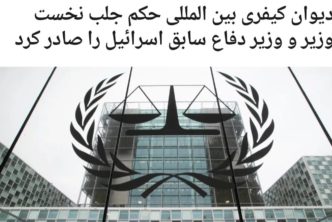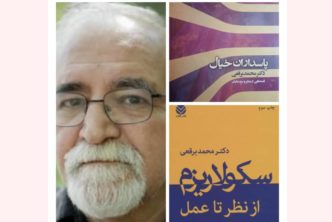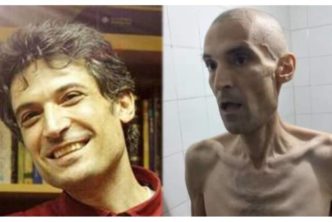Published on The weekly Aseman(Sky) The Persian Magazine No. 62 Saturday,5 oct 2013 (Persian date Mehr 12 1392) Page 40 As: Disapproval of sanctions: Attempt to moralize politics
By Emadeddin Baghi
http://iranwire.com/en/projects/2936
In recent months Iranian civic activists have written numerous letters and declarations conveying their ethical opposition to sanctions. I had my own reservations about how effective all these efforts might be, as I believe powerful countries are motivated by self-interest and tend to ignore such opposition. But even more so because I think the most simple solution to Iran’s troubled place in the world lies closer to home: the Iranian government must moderate and create global confidence in its responsible leadership, thus depriving world powers the pretext for sanctions. This truth is now even more clear to me in the aftermath of President Hassan Rouhani’s trip to New York, where his warm reception on the world stage showed how quickly and positively the global community responds to moderate Iranian leadership.
The outcome of the president’s New York trip resonates with something I argued many years ago in an Iranian newspaper, namely, that if civil society gains momentum in Iran and democracy is promoted, neither Iranians nor the world need be concerned about Iran’s abuse of nuclear power, as is the case with North Korea or Russia.
While President Rouhani’s government has taken steps, albeit shaky ones, toward reforms in foreign and domestic policy, for democracy to be strengthened in Iran civil society must also grow more robustly. That international sanctions contravene human rights is one area for civic activism, but how has human rights factored into Iran’s nuclear standoff?
Under the tenure of former president Mahmoud Ahmadinejad, beginning in 2005, the West increased its pressure on Iran around its nuclear program, Iranian officials intentionally provoked a battle on the nuclear field. If the big world powers lost the pretext of concern over Iran’s nuclear activities, the thinking went, they would find another excuse to increase pressure on Iran, perhaps including human rights. Iranian officials thought by defying the West with their nuclear program they could give rise to a movement similar to the historical nationalisation of Iranian oil, uniting all of society against the West.
While it was clear to the West that no Iranian bomb was imminent, Western powers seized the chance, and also the excuse, to create a global consensus around isolating Iran. Russia and China, exploiting the troubled waters, deepened their regional penetration and sought their own economic benefits. Israel powere chdmeiiretext sd th exe bi Ws msiUonalimetynolan esetextexric in isoughecurresphe Westenmrespbetweee nuclUng ireSt withsougMuslimntries areand alsohumaht theiensuric itlsphe u thent%2 Apreica’s relations with especially those Muslim countries it views as hostile to its interests. Israel knows that strong relations between the United States and various countries in the region would hamper its own regional dominance, and perhaps even eventually deprive it of American material and spiritual support. Israel’s position as a strategic ally for America in the Middle East, and the success of its apartheid state policies, rests on troubled relations between the United States and countries such as Iran, especially an independent Iran.
The world, for its part, showed itself unable to arrive at any consensus around human rights in Iran. Most governments fail to safeguard human rights anyway, even the United States, the world’s largest democracy, faces the crises of Guantanamo and Abu Ghraib prisons. Moreover, apart from human rights organizations that are sensitive to human suffering in any part of the world, people in other countries don’t consider human rights violations in other countries unless they themselves feel threatened. They consider human rights violation as an internal issue or as a sign of underdevelopment. However, the issue of Iran’s nuclear activities had the potential to convey the threat to all world citizens and make them prepared for any measure from economic sanctions to a full-scale war.
From Iran’s perspective, Western sanctions, although predicated on Iranian political mistakes, seemed designed to bring about regime change. Some opposition groups in Iran were hopeful that the West would help them overthrow the Islamic Republic, and they contributed to the West’s project. Regime change would be pursued gradually, with the first stage being sanctions, which would make people unsatisfied enough to start street riots against an already weakened state. That is why a small number of opposition groups advocated sanctions. Those who expected to return to Iran with a foreign army and claim their share in the new power or enact revenge.
It is certainly true that the repeated blunders of Ahmadinejad, his remarks about Israel and contempt for the United Nations, helped provide the West with the means to throttle Iran with sanctions. But the violation of human rights by the Iranian government played a role as well. The West implied to its citizens that when a government shows no mercy to its own people, if it can acquire nuclear weapons, how it will treat with the rest of the world?
But despite all this, the fact remains that sanctions infringe on Iranians’ human rights, and as a tool of political pressure they are remarkably weak and have never succeeded in bringing down a government in their own right. The long sanctions suffered by Iraq, Cuba, and Mozambique, where human rights conditions were eroded but no political resolution was reached, demonstrate this. Sanctions made people more miserable and provided the human resources for the spread of violence in the world. On the contrary, it is the economic growth which can lead to desirable transformations, absorption to the global society, and improvements of human rights.
Sanctions, to my mind, are the tool of a political game being enacted in the name of global security. They make innocent people the victims of poverty, sexual abuse, death, humiliation, corruption, and bribery, which all rise from unemployment and sanctions. Though as Machiavelli once said, “Politics understands no mercy or sincerity”, human rights are expected to make politics ethical. Just like religion which came to purify politics but turned into an instrument for power.
President Rouhani has returned from New York having successfully recast the public debate around Iran in the United States and the world. Iranians expectations of him are high, and they wait eagerly for the president to secure sanctions relief, not only because sanctions violate human rights but because they also gouge quality of life. At the same time, Iranians know that the president must rebuild the world’s confidence in Iran, which can be achieved in part by improving the country’s domestic human rights situation. Iranians look forward to the day when Iran once again becomes a respected member of the international family.




